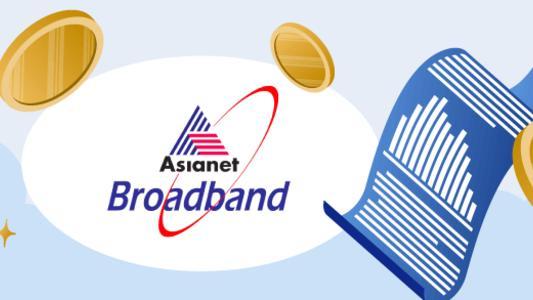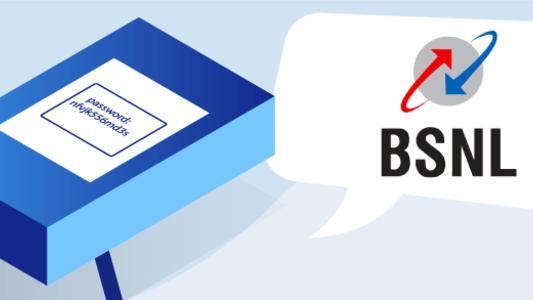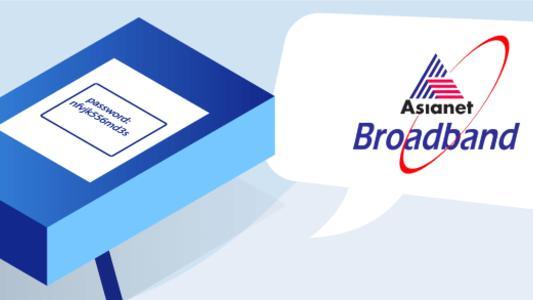The Best Broadband Provider in India 2025

In India, with the rapid advancement of technology and the increasing demand for online connectivity, choosing the right broadband provider becomes important. With internet providers like Airtel Xstream, JioFiber, ACT Fibernet, Excitel around, it has become a bit difficult. If you'd like to fix a broadband ISP for your house, keep reading to learn how to locate a broadband provider in India.
Did You Just Google "Broadband Provider Near Me"?
Did you find yourself searching for "Broadband Provider Near Me"? In India, where connectivity is key, selecting the right broadband provider is essential. Beyond mere proximity, consider factors such as internet speed, reliability, customer service, and affordability. Ensure smooth connectivity for your online activities, whether it's streaming your favorite shows, attending virtual meetings, or gaming with friends. With a wide range of options available, make an informed decision that caters to your specific needs and enhances your online experience.
What Should I consider When Choosing a Broadband Provider?
Broadband services play a crucial role in connecting individuals, businesses, and communities. When selecting a broadband provider, it's essential to consider several factors to ensure that you choose the best option for your needs. Here are some key factors to keep in mind:
Type of Internet Connection
When picking an internet service, the kind of broadband connection matters a lot. Internet providers offer different wireless services like DSL, Cable modems, and Fiber-optic networks, depending on how the network works and where you live. If all three types are available in your city, you can pick the one that suits you best. But if one type isn't available where you are, you'll need to explore other providers to find the best one for your internet needs.
The first step in choosing the type of internet provider is knowing what is eligible in your area. There are two significant causes why you must do this initially:
- Not each service provider is usable in every location. Since coverage areas vary from service to service, the options would be confined to the carriers that offer service in your region right away.
- Prices, speeds, promotional sales, and product lineups differ by location as well. Often review the availability of a service in your region before deciding on it. Similarly, certain carriers have varying price models for different locations, so be ready to pay more—or less—after a transfer.
- Consider the following top broadband providers in India when browsing for decent service providers:
- Airtel Broadband
- Spectra Broadband
- ACT Broadband
- YOU Broadband
- Tikona Broadband
- Excitel Broadband
- BSNL Broadband
- JioFiber Broadband
- TataPlay Broadband
Evaluate The Broadband Provider Price And Speed
You want an internet package with good speed, reliable service, and enough data each month, all without breaking the bank. After narrowing down your options, compare the providers in your area to find the best fit for you. Each provider has its own strengths, so it's important to choose one that matches your needs. Here are the key factors to consider:
- Pricing and packages
- Speed options
- Installation and equipment costs
- Customer satisfaction ratings
- Data caps and overage charges
Some providers offer superfast speeds, while others have simpler and more affordable plans. Many also have data limits, though some offer unlimited access. Also, reliability and customer support can vary between providers. Keep an eye out for discounts and promotions, including ones that may help offset installation costs.
Broadband How-Tos
If you are facing any issues related to your Wi-Fi router or relocation;Click
How Much Internet Bandwidth You Need?
Now it's time to figure out how much speed you really need. To smoothly handle all your daily Wi-Fi tasks, you'll want internet service with adequate download and upload speeds. You want fast broadband, but not too fast, or you might end up paying for more speed than you actually use.
When determining your speed needs, consider the following questions:
- How often do you stream movies and TV shows online?
- Streaming content in 1080p typically requires around 5 Mbps, while 4K OTT streaming may need speeds of at least 25 Mbps or higher for optimal performance.
- How many users regularly watch and download content on their devices in your household?
- The more devices connected to your home network, the more bandwidth is consumed. It's good to have some extra speed to ensure everyone can use the Wi-Fi simultaneously without issues.
- What other smart home devices are connected to your internet?
- Devices like Bluetooth surveillance cameras that constantly upload data can quickly eat up your bandwidth, so consider these when assessing your speed requirements.
Data Limits and Fair Usage Policies
Some broadband plans may have data caps or fair usage policies, which can affect your internet usage. Be sure to understand any limitations on data usage and consider whether unlimited data plans or plans with higher data caps are available if you have high internet usage requirements.
Internet Speed test
Now that you know how much internet speed you need, test your current network to see how it stacks up. You might already feel satisfied with your new internet service, but checking its speed can give you a precise measurement. This baseline will help you compare different providers and services more accurately.
Customer Service and Support
Excellent customer service and support are essential, especially when you encounter technical issues or need assistance with your connection. Research the reputation of the broadband provider for customer service, read reviews, and consider factors such as availability of customer support channels and response times.
Additional Features and Benefits
Consider any additional features or benefits offered by the broadband provider, such as free installation, complimentary Wi-Fi routers, bundled services (e.g., TV or phone), or access to premium streaming services. These extras can add value to your broadband subscription.
Contract Terms and Flexibility
Review the contract terms and conditions, including the length of the contract, early termination fees, and any penalties for changes or upgrades to your plan. Look for providers that offer flexible contract options or no-contract plans if you prefer more freedom and flexibility.
Reviews and Recommendations
Finally, seek out reviews and recommendations from friends, family, or online forums to gather insights from other users' experiences with different broadband providers. Pay attention to factors such as overall satisfaction, reliability of the connection, and quality of customer service.
Comparison of Broadband Plans
To make an informed decision, it's essential to compare the broadband plans offered by different providers. Factors such as speed options, pricing, and additional features should be carefully evaluated to determine the best fit for your needs. Following are the listed below top 5 broadband providers in India:
Reliance JioFiber: The Game Changer
Reliance JioFiber has disrupted the broadband market with its high-speed internet and attractive packages. With features like unlimited data, free voice calls, and access to premium OTT platforms, JioFiber has become a preferred choice for many users.
JioFiber Plans: Best Broadband Provider in India
The cheapest JioFiber Plans in 2024
Find by JioFiber the cheapest and best broadband subscription for you!

30 Mbps

100 Mbps

300 Mbps
Airtel Xstream Fiber: A Reliable Choice
Airtel Xstream Fiber offers lightning-fast internet speeds and a wide range of plans to suit varying requirements. With reliable connectivity and excellent customer support, Airtel has established itself as a reliable broadband provider in India. Below, we have listed Airtel Xstream plans that are below, ₹1000:
| Airtel Internet Plan | Price | Airtel Internet Speed | Validity | Airtel Internet Plan Benefits |
|---|---|---|---|---|
| Airtel Basic Broadband Plan | ₹499 | Unlimited @Up to 40 Mbps | 1 Month |
|
| Airtel Standard Broadband Plan | ₹799 | Unlimited @Up to 100 Mbps | 1 Month |
|
| Airtel Entertainment Broadband Plan | ₹999 | Unlimited @Up to 200 Mbps | 1 Month |
|
ACT Fibernet: Speed and Efficiency
ACT Fibernet is known for its blazing-fast internet speeds and consistent performance. With a focus on customer satisfaction, ACT offers competitive pricing and a variety of plans tailored to different user needs. ACT Fibernet plans that start from as little as ₹499 up to ₹2999, depending on the city.
ACT Fibernet Top Offer!
Get 50 Mbps Internet with a free router and 300+ HD TV channels and OTT apps like Disney Hotstar, SonyLiv, Zee5 and more at no extra cost!
Top ACT Fibernet Offer @
BSNL Broadband: Traditional Yet Trusted
BSNL Broadband, a government-owned telecom operator, continues to be a trusted choice for many users. With extensive coverage and competitive pricing, BSNL ensures connectivity even in remote areas. Check out this list of BSNL wifi plans below, ₹1000 here:
| BSNL WiFi Plans | Fixed Monthly Charges | Benefits |
|---|---|---|
| Rural FTTH Voice Unlimited | ₹249 | Speed: 10 Mbps up to 10GB, then 1 Mbps *For new customers only |
| Urban FTTH Voice Unlimited | ₹299 | Speed: 10 Mbps up to 20GB, then 1 Mbps *For new customers only |
| Fiber Home WiFi/Ghar ka WiFi | ₹399 | Speed: 30 Mbps up to 1000GB, then 4 Mbps *For individual category only in rural areas |
| Fibre Basic Neo | ₹449 | Speed: 30 Mbps up to 3300GB, then 4 Mbps Data: Unlimited download Voice: Unlimited |
| Fibre Basic | ₹499 | Speed: 40 Mbps up to 3300GB, then 4 Mbps Data: Unlimited download Voice: Unlimited |
| Fibre Basic Plus | ₹599 | Speed: 60 Mbps up to 3300GB, then 4 Mbps *For new customers only |
| Fibre Basic Plus OTT | ₹666 | Speed: 60 Mbps up to 3300GB, then 4 Mbps Data: Unlimited download Voice: Unlimited Free OTT: Disney+Hotstar |
| Fibre TB Plan | ₹777 | Speed: 100 Mbps up to 1500GB, then 5 Mbps Data: Unlimited download Voice: Unlimited |
| Fibre Value OTT | ₹799 | Speed: 100 Mbps up to 1000GB, then 5 Mbps Data: Unlimited download Voice: Unlimited Free OTT: Disney+Hotstar, Sony LIV, Zee5, Yupp TV |
| Fibre Values Plus | ₹849 | Speed: 100 Mbps up to 3300GB, then 10 Mbps Data: Unlimited download Voice: Unlimited |
| Fibre Super Star Premium Plan | ₹999 | Speed: 150 Mbps up to 2000GB, then 10 Mbps Data: Unlimited download Voice: Unlimited Free OTT: Disney+Hotstar, Sony LIV, Zee5, Yupp TV, Lionsgate, Shemaroo, Hungama |

Stay with us & view all offers
The best broadband comparisons, carefully reviewed and updated plans exclusively for you!
Excitel Broadband: Affordable and Accessible
Excitel Broadband stands out for its affordability and widespread availability. With budget-friendly plans and reliable service, Hathway caters to a broad customer base across India. Few of the best plans from Excitel are listed below:
| Excitel Internet Plans: Name | Bundled Costs & Discount | Benefits |
|---|---|---|
| The Cable Cutter: Wifi + OTT + IPTV |
|
|
| The Cable Cutter: WiFi + OTT |
|
|
| The Cable Cutter |
|
|
| The Kickstarter |
|
|
| The Kickstarter |
|
|
Other Broadband Providers and Their Speed
Apart from the listed top 5 broadband internet providers in India; we have listed few more so that you can consider if they are available in your area based on their average upload & download speed and average latency.
| Provider name | Avg. download | Avg. upload | Avg. latency |
|---|---|---|---|
| Tata Play Fiber | 112,83 Mb/s | 100,61 Mb/s | 16 ms |
| Excitel | 107,38 Mb/s | 119,86 Mb/s | 15 ms |
| Ani Network | 90,45 Mb/s | 85,96 Mb/s | 12 ms |
| ACT Fibernet | 88,80 Mb/s | 85,10 Mb/s | 18 ms |
| Hathway | 84,82 Mb/s | 71,31 Mb/s | 31 ms |
| Asianet | 75,84 Mb/s | 77,12 Mb/s | 45 ms |
| Netplus Broadband | 64,95 Mb/s | 60,83 Mb/s | 30 ms |
| Alliance Broadband Services Pvt. | 61,83 Mb/s | 61,01 Mb/s | 38 ms |
| Gtpl Kcbpl Broadband Pvt | 50,22 Mb/s | 49,93 Mb/s | 42 ms |
| GTPL Broadband | 48,01 Mb/s | 52,18 Mb/s | 26 ms |
| Tikona Infinet | 45,95 Mb/s | 31,66 Mb/s | 25 ms |
| RailTel Corporation Of India Ltd. | 45,18 Mb/s | 44,60 Mb/s | 37 ms |
How To Find Broadband Providers: Frequently Asked Questions
Which broadband provider offers the highest speed in India?
Reliance JioFiber and Airtel Xstream Fiber are known for offering high-speed internet connections in India.
Is customer service an important factor when choosing a broadband provider?
Yes, excellent customer service ensures that any issues or concerns are promptly addressed, enhancing the overall user experience.
Are there any hidden charges in broadband plans?
It's essential to carefully read the terms and conditions of broadband plans to understand any potential hidden charges, such as installation fees or equipment rental costs.
Can I switch my broadband provider easily?
Switching broadband providers is typically straightforward, but it's essential to check for any contractual obligations or termination fees with your current provider.









